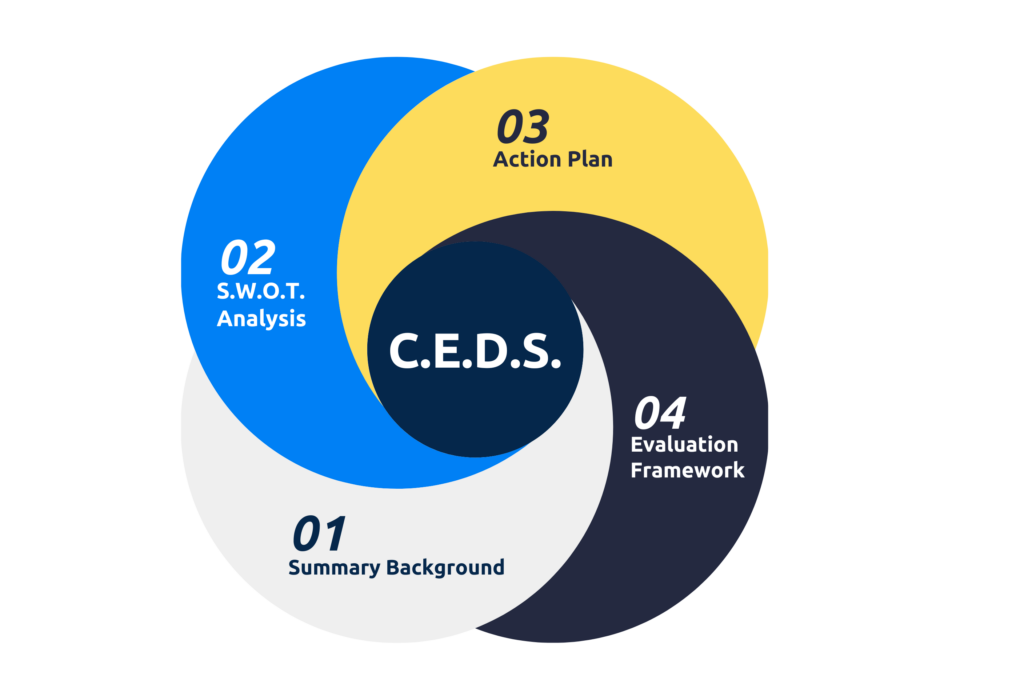The Kentuckiana Regional Planning & Development Agency (KIPDA) is a designated Economic Development District (EDD) through the U.S. Economic Development Administration (EDA). As the region’s Area Development District (ADD), KIPDA is required to develop a Comprehensive Economic Development Strategy (CEDS) that identifies regional priorities and economic and community development strategies.
KIPDA provides regional planning, review, and technical services in the areas of community/economic development, social services, and transportation as well as community ride-sharing programs for a nine county area centered around Metro Louisville; including Jefferson, Oldham, Trimble, Henry, Shelby, Spencer, and Bullitt counties in Kentucky, and Clark and Floyd counties in Indiana. KIPDA also coordinates various services for persons 60 years of age or over. The agency is designated by the Kentucky State Clearinghouse as the regional review agency for virtually all applications for federal and or state funds made by organizations or governments within the Commonwealth of Kentucky.
Equity Commitment
In the 2023 CEDS Content Guidelines, the U.S. EDA recommended incorporating equity into the CEDS to strengthen the quality of the process and the document. This recommendation led KIPDA and the CEDS committee to begin looking at our current CEDS in regard to equity and begin the conversation on how to make improvements to make economic development in the region more inclusive.
Equity language in the CEDS will continue to evolve as work continues to develop a document that best serves the region. Some steps that KIPDA and the CEDS committee have made this year is to revamp the Summary Background and include language that is more representative of the region. Our Transportation Division designates Environmental Justice areas based on established criteria which have been incorporated in the CEDS. KIPDA is committed to greatly strengthening public outreach during the development of the CEDS and the public comment period. We will be evaluating how we publish public comment notices and to whom notices are distributed to ensure that cumulatively, those that are receiving notice for an opportunity to provide public comment are representative of the region as a whole.
KIPDA is greatly improving the quality of the CEDS through the CEDS committee which provides a more collaborative approach to its development. KIPDA pledges to improve on this collaboration by ensuring that the CEDS committee makeup is diverse, and representative of the entire region.
KIPDA is in the process of developing its application for a Revolving Loan Fund for the region. KIPDA staff have begun the process of revisiting the draft application and draft plan to ensure that the structure of the proposed RLF is in line with the updated CEDS recommendations.
Environmental Justice
For the KIPDA 2024 CEDS plan update, we changed our methodology to match that of the Climate and Economic Justice Screening Tool (CEJST) since that is what is now being used when applying for many federal grants.
Important changes are that we are moving away from our in house created Environmental Justice areas that were tailored for the CEDS plan (that used Census Block Groups instead of Census Tracts to give more detail and nuance to the maps and areas themselves), and back to the Census Tracts used in this tool. While Census Tracts are a little less detailed, this tool provides more insight into various factors in the region that might make an area a Disadvantaged Community. Again, Indiana was not included as only Kentucky counties are in the KIPDA Area Development District (KIPDA ADD).
This plan follows the new guidelines released by the U.S. Economic Development Administration in 2023. The CEDS strategies were developed in coordinated effort between local government officials, community representatives, and each KIPDA division. The following required four sections form the basis of the KIPDA Comprehensive Economic Development Strategy.

